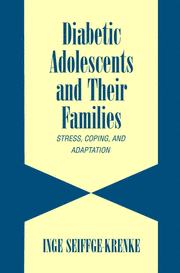Book contents
- Frontmatter
- Contents
- Foreword by Stuart T. Hauser
- Preface
- 1 Epidemiology of Chronic Illnesses in Adolescence
- 2 Coping with Illness in Adolescence: An Overview of Research from the Past 25 Years
- 3 Coping with Diabetes: A Longitudinal Study
- 4 Knowledge of the Illness, Compliance, and Patient–Physician Relationships
- 5 Self-Concept, Body Image, and Perceived Health
- 6 Adolescent, Parental, and Family Coping with Stressors
- 7 Chronic Illness and the Family: The Perspectives of Mothers, Fathers, and Siblings
- 8 Friendships, Romantic Relationships, School, and Career
- 9 Successful Adaptation or the Development of Psychopathology?
- 10 Pathways for Resolving the Dilemma between Developmental Progression and Adaptation to the Illness
- 11 Implications for Prevention and Intervention
- References
- Index
9 - Successful Adaptation or the Development of Psychopathology?
Published online by Cambridge University Press: 06 August 2009
- Frontmatter
- Contents
- Foreword by Stuart T. Hauser
- Preface
- 1 Epidemiology of Chronic Illnesses in Adolescence
- 2 Coping with Illness in Adolescence: An Overview of Research from the Past 25 Years
- 3 Coping with Diabetes: A Longitudinal Study
- 4 Knowledge of the Illness, Compliance, and Patient–Physician Relationships
- 5 Self-Concept, Body Image, and Perceived Health
- 6 Adolescent, Parental, and Family Coping with Stressors
- 7 Chronic Illness and the Family: The Perspectives of Mothers, Fathers, and Siblings
- 8 Friendships, Romantic Relationships, School, and Career
- 9 Successful Adaptation or the Development of Psychopathology?
- 10 Pathways for Resolving the Dilemma between Developmental Progression and Adaptation to the Illness
- 11 Implications for Prevention and Intervention
- References
- Index
Summary
This chapter discusses the question of whether the outbreak of a chronic illness in adolescence leads to delays in developmental progression. This question, which is undoubtedly just as relevant to younger age groups and to other illnesses, is investigated by using the paradigm of diabetic patients. Once again, the data are taken from our longitudinal study of diabetic and healthy adolescents and their families (see chapter 3). In addition, the prevalence of psychological disturbances in adolescents suffering from other chronic illnesses will also be examined. As already mentioned (chapter 2), numerous yet contradictory findings on this matter have been reported. Although some studies appear to have demonstrated that chronically ill adolescents have two or three times the risk of developing psychopathology, others have documented that most ill adolescents cope with their disease without showing any clinical symptoms. The results obtained from our longitudinal study will be analyzed further in chapter 10 with respect to the different pathways that may be involved in the development of psychopathology, and adolescents and their families that coped successfully with the illness will be compared with those that did not.
Does Chronic Illness Lead to Developmental Delays?
If individuals are particularly vulnerable during transition phases (Antonovsky, 1981), then the occurrence of a critical event, such as the onset of a chronic illness, during these times becomes especially signicant.
- Type
- Chapter
- Information
- Diabetic Adolescents and their FamiliesStress, Coping, and Adaptation, pp. 203 - 231Publisher: Cambridge University PressPrint publication year: 2001

